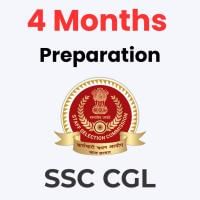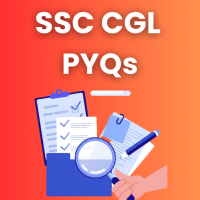SSC CGL Exam > SSC CGL Questions > By the time you arrive, they ____________ the...
Start Learning for Free
By the time you arrive, they ____________ the meeting.
- a)will start
- b)will have started
- c)has started
- d)have started
Correct answer is option 'B'. Can you explain this answer?
Verified Answer
By the time you arrive, they ____________ the meeting.a)will startb)wi...
The future perfect tense "will have started" is the correct choice. It suggests that the meeting will begin before your arrival and will be in progress or possibly finished by that time. The other options don't correctly use the future perfect tense, which is required to show an action that will be completed before a certain future moment.
View all questions of this test
Most Upvoted Answer
By the time you arrive, they ____________ the meeting.a)will startb)wi...
Understanding Future Perfect Tense
When analyzing the sentence "By the time you arrive, they ____________ the meeting," the correct option is "will have started." This choice relies on the rules of English tenses, specifically the future perfect tense.
Future Perfect Tense Explanation
- The future perfect tense is used to describe an action that will be completed before a specific point in the future.
- In this case, "by the time you arrive" indicates a future point at which another action (the meeting starting) will have already been completed.
Why Option B is Correct
- "Will have started": This phrase indicates that the meeting is expected to be finished before your arrival, which aligns with the future perfect tense structure (will + have + past participle).
Why Other Options are Incorrect
- Option A: "will start"
- This implies that the meeting will begin after your arrival, which contradicts the context of the sentence.
- Option C: "has started"
- The present perfect tense is not appropriate here since it does not fit the future context of the sentence.
- Option D: "have started"
- This option also fails to align with the future perspective required by "by the time you arrive."
Conclusion
Choosing "will have started" is correct because it accurately conveys that the meeting will be completed prior to your arrival, adhering to the future perfect tense's function.
When analyzing the sentence "By the time you arrive, they ____________ the meeting," the correct option is "will have started." This choice relies on the rules of English tenses, specifically the future perfect tense.
Future Perfect Tense Explanation
- The future perfect tense is used to describe an action that will be completed before a specific point in the future.
- In this case, "by the time you arrive" indicates a future point at which another action (the meeting starting) will have already been completed.
Why Option B is Correct
- "Will have started": This phrase indicates that the meeting is expected to be finished before your arrival, which aligns with the future perfect tense structure (will + have + past participle).
Why Other Options are Incorrect
- Option A: "will start"
- This implies that the meeting will begin after your arrival, which contradicts the context of the sentence.
- Option C: "has started"
- The present perfect tense is not appropriate here since it does not fit the future context of the sentence.
- Option D: "have started"
- This option also fails to align with the future perspective required by "by the time you arrive."
Conclusion
Choosing "will have started" is correct because it accurately conveys that the meeting will be completed prior to your arrival, adhering to the future perfect tense's function.

|
Explore Courses for SSC CGL exam
|

|
Question Description
By the time you arrive, they ____________ the meeting.a)will startb)will have startedc)has startedd)have startedCorrect answer is option 'B'. Can you explain this answer? for SSC CGL 2025 is part of SSC CGL preparation. The Question and answers have been prepared according to the SSC CGL exam syllabus. Information about By the time you arrive, they ____________ the meeting.a)will startb)will have startedc)has startedd)have startedCorrect answer is option 'B'. Can you explain this answer? covers all topics & solutions for SSC CGL 2025 Exam. Find important definitions, questions, meanings, examples, exercises and tests below for By the time you arrive, they ____________ the meeting.a)will startb)will have startedc)has startedd)have startedCorrect answer is option 'B'. Can you explain this answer?.
By the time you arrive, they ____________ the meeting.a)will startb)will have startedc)has startedd)have startedCorrect answer is option 'B'. Can you explain this answer? for SSC CGL 2025 is part of SSC CGL preparation. The Question and answers have been prepared according to the SSC CGL exam syllabus. Information about By the time you arrive, they ____________ the meeting.a)will startb)will have startedc)has startedd)have startedCorrect answer is option 'B'. Can you explain this answer? covers all topics & solutions for SSC CGL 2025 Exam. Find important definitions, questions, meanings, examples, exercises and tests below for By the time you arrive, they ____________ the meeting.a)will startb)will have startedc)has startedd)have startedCorrect answer is option 'B'. Can you explain this answer?.
Solutions for By the time you arrive, they ____________ the meeting.a)will startb)will have startedc)has startedd)have startedCorrect answer is option 'B'. Can you explain this answer? in English & in Hindi are available as part of our courses for SSC CGL.
Download more important topics, notes, lectures and mock test series for SSC CGL Exam by signing up for free.
Here you can find the meaning of By the time you arrive, they ____________ the meeting.a)will startb)will have startedc)has startedd)have startedCorrect answer is option 'B'. Can you explain this answer? defined & explained in the simplest way possible. Besides giving the explanation of
By the time you arrive, they ____________ the meeting.a)will startb)will have startedc)has startedd)have startedCorrect answer is option 'B'. Can you explain this answer?, a detailed solution for By the time you arrive, they ____________ the meeting.a)will startb)will have startedc)has startedd)have startedCorrect answer is option 'B'. Can you explain this answer? has been provided alongside types of By the time you arrive, they ____________ the meeting.a)will startb)will have startedc)has startedd)have startedCorrect answer is option 'B'. Can you explain this answer? theory, EduRev gives you an
ample number of questions to practice By the time you arrive, they ____________ the meeting.a)will startb)will have startedc)has startedd)have startedCorrect answer is option 'B'. Can you explain this answer? tests, examples and also practice SSC CGL tests.

|
Explore Courses for SSC CGL exam
|

|
Signup for Free!
Signup to see your scores go up within 7 days! Learn & Practice with 1000+ FREE Notes, Videos & Tests.


















